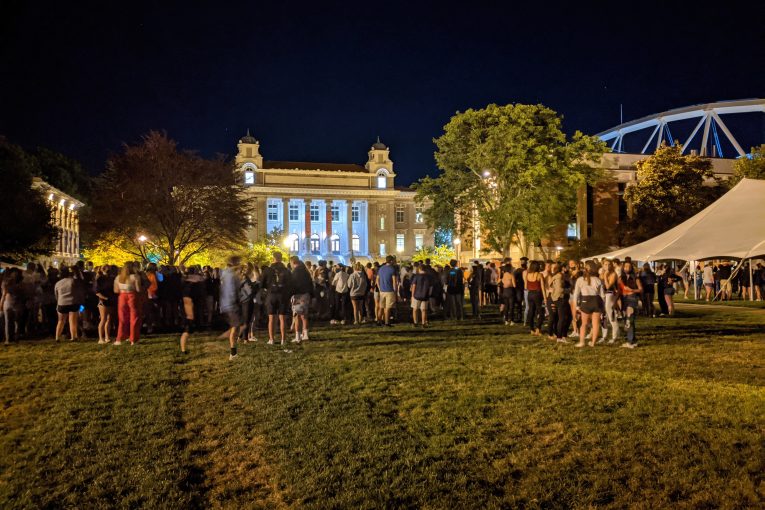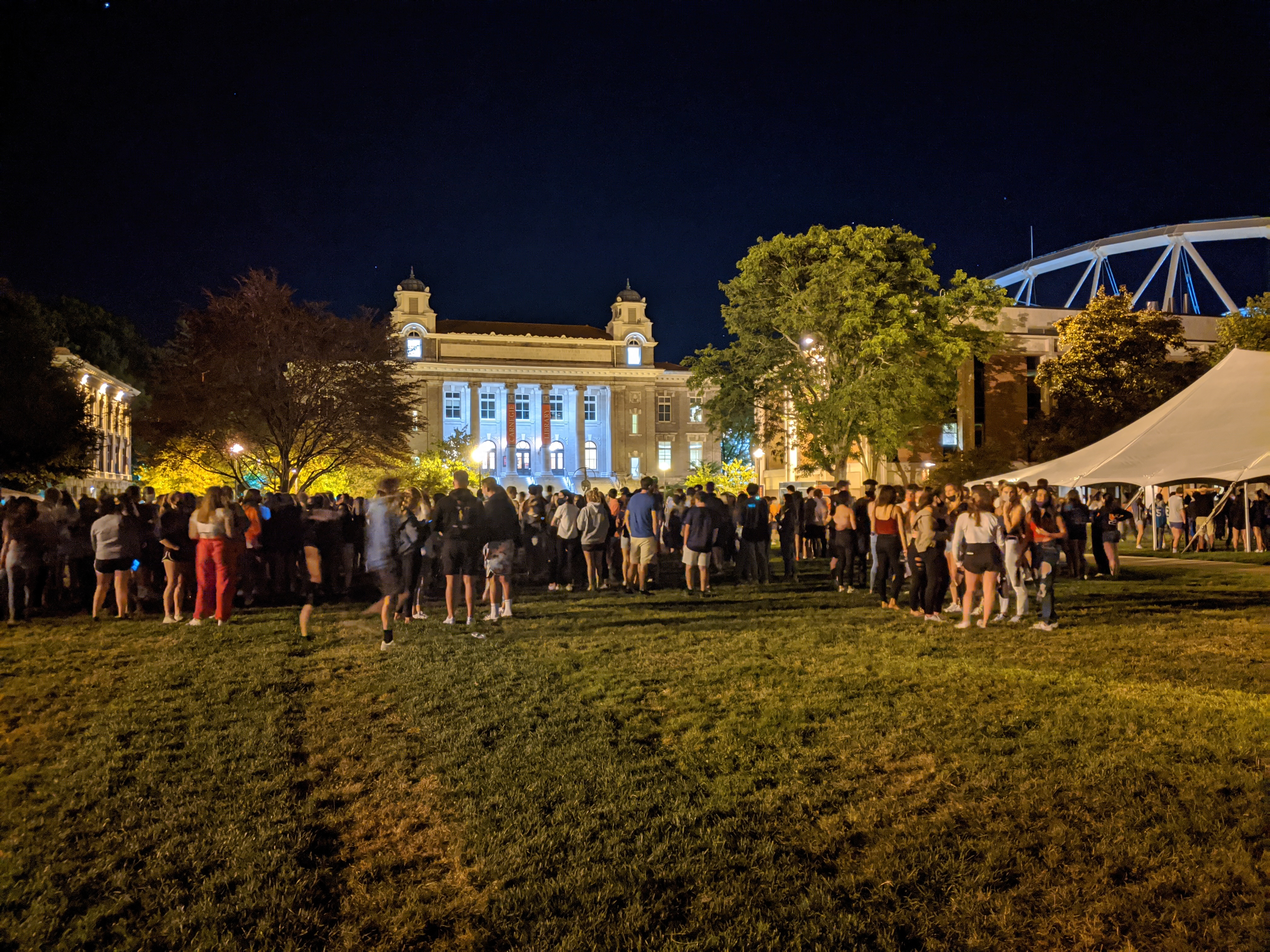

By David M. Greenwald
In Syracuse this week on Wednesday, a large group of first-year students gathered on the Quad late at night, prompting an angry message from the Vice Chancellor warning that “the students who gathered on the Quad last night may have done damage enough to shut down campus, including residence halls and in-person learning, before the academic semester even begins.”
An investigation is underway, but he warned, “I want you to understand right now and very clearly that we have one shot to make this happen.”
This comes just a few days after another university—UNC-Chapel Hill—announced it was “ending in-person instruction for undergrads just a week after reopening after dozens of students living in dorms and a fraternity house tested positive for coronavirus.”
The scene is playing out across the country as well, even as many on the west coast, including UC Davis, have already announced that, for fall at the very least, there will not be in-person instruction.
There are a lot of lessons in this—and certainly some will question the wisdom of opening at all, while others will criticize a bunch of 18-year-olds for wanting to hang out in their first college experience away from home—but for me, it illustrates something else, which is that ultimately COVID is not going to fundamentally change higher education.
A survey over the summer illustrated this. An Axios poll found that 76 percent of students planned to return to campus if schools gave them the option and 66 percent said they would attend in-person classes if those were on the table. Most said they were willing to wear face masks and download an app to conduct contact tracing, and 67 percent would leave campus again if there was a major outbreak in their community.
Another 79 percent of surveyed students said that they would not attend parties the way they did before the COVID-19 pandemic.
I was discussing this issue yesterday and, as one person put it, you could have most people behaving responsibly—but a small number of people acting irresponsibly can shut down an entire campus.
More important than the impact on this fall, which seems headed toward most colleges again being shut down except for distance learning, is this—students want to return to campus. They don’t want to be taking class via Zoom or Skype.
This is an important thing to understand. When I read through dozens of emails on the University Commons, many of the people arguing for the council to oppose the project argued that COVID and the uncertainty around COVID was a reason to not approve it.
As one person put it: “We don’t even know how many or when students might be living in Davis year-long.”
This project isn’t about the 2020-21 school year, it might be more about the 2024-25 school year. There are those who are arguing that COVID might change the way that colleges deliver instruction. I
 think that’s “wishful thinking” or perhaps “convenient” thinking—they oppose the project and are inferring reasons for doing so.
think that’s “wishful thinking” or perhaps “convenient” thinking—they oppose the project and are inferring reasons for doing so.
Certainly, it is not thinking based on talking to students about their intentions. So I did exactly that over the course of the last week and probably had conversations with several dozen. The immediate plans for students is mixed—many will stay at their parents’ houses this fall, some will come to Davis and take their classes online, and most plan to return as soon as they possibly and safely can.
That mirrors the national trend.
In April, Inside Higher Ed reported, “College students say the online instruction they’re getting in the wake of the coronavirus pandemic is not the education for which they paid. Some students plan to withhold tuition payments; others are demanding partial tuition refunds.”
While that was April, the talk this week is not much different.
The New York Times reported this week, “Schools face rising demands for tuition rebates, increased aid and leaves of absence as students ask if college is becoming ‘glorified Skype.’”
The issues of cost and financial assistance are at the forefront here, but beneath the surface is the notion that online education is no replacement for in-person instruction.
As one educator put it: “This is a moment that is basically forcing students and parents to say, ‘What is the value? If I can’t set foot on campus, is that the same value?’”
Will Andersen, an 18-year-old incoming freshman at the University of Wisconsin-Madison, put it this way: “Who wants to pay $25,000 a year for glorified Skype?”
“Education isn’t just information,” agreed Yolanda Brown-Spidell, a Detroit-area teacher talking to the Times.
“Being able to meet up with friends, have those highly intellectual conversations, walking over to CVS, and getting ice cream at 1 in the morning,” she said. “And let’s not forget just not being home with your mama, with her eyes on you.”
In the local debate, though, the question is not about this quarter. It seems prudent and logical that UC Davis would be shut down to in-person instruction until the pandemic is under control. For me, the question is more about the longer term. And the people who are arguing that COVID will bring about long-term changes in population, I think, are simply not paying attention to the national discussion and certainly are not talking to the student population at issue.
I know my life would be extremely different right now if, instead of moving to Davis in 1996 to attend graduate school, I stayed in San Luis Obispo and took the courses online. That would have been life-altering and not in a good way.
For now, it remains prudent to shut down in-person instruction, but at some point, we are going to have to think about how to move forward—either with a vaccine or with new rules for social interaction. Either way, not planning for adequate housing while we wait seems irresponsible, and the kind of policy that helped create the housing crisis here to begin with.
—David M. Greenwald reporting







And I thought Chico State was a ‘party school’!
Will videos be available?
I waited until I graduated, had a steady job, got married, before I fathered. [No videos]
Let’s see… freshmen, fathering… sounds like in-person learning to me…
Typo. Should have been “gathered”
If you google it, you can find a video.
I have the day off from my real job, so a little late here, Bill.
cathy
No reflection on you, Cathy/Highbeam (double entendre not intended!)…
I don’t know if you’ve played competitive tennis, Cathy… I have…
Sometimes a ball comes over the net, and you just feel you need to do an “overhead smash”… even when you know it was an error by the other person… it just is…
lol
Feel free to delete all my comments on this thread… it was “too easy”… but hit my funny bone, big time! Particularly since it showed up twice… 50 years ago, two common ‘opinions’ were guys went to college to get laid (‘sow their wild oats’), and women went to college to get their MRS degrees… a kernel of truth in both… but, de minimus… in both cases…
Yet, a truth is that often, with in-person attendance, many young men and young women find their ‘life-partners’ in college… that is real… and not a bad thing… they find common interests in a setting away from parental control, open to learning… that might happen in a ‘video’ environment, but am thinking, not so much…
And in many disciplines, chemistry, engineering, to name two, hands-on lab work is essential… many folk (I’m one) can only go so far with intellectual learning… we’re known as ‘tactile learners’, at least in part…
Why increased aid if they aren’t attending classes and can Zoom from home? What possible extra costs could be involved that aren’t offset by not actually having to be in school? It sounds like never waste a good crises, we’ve taught our children well.
Keith, because of COVID, the part-time jobs many students rely on for supplemental income simply don’t exist.
“So the kids, they dance, they shake their bonesAnd the politicians throwing stonesSinging ashes, ashes, all fall downAshes, ashes, all fall down”
John Perry Barlow
A peaceful place, or so it looks from spaceA closer look reveals the human raceFull of hope, full of grace, is the human faceBut afraid we may lay our home to waste
Same song
Yeap. Here’s your real issue. And, it’s one that is potentially more impactful for universities, rather than students.
Students often challenge tuition. Even though the amount that resident students pay is a fraction of their actual cost.
Is this occurring at UCD?
I wonder if International students are demanding their (approximately) $45,000/year back? Somehow, I doubt that they’re at the forefront of this – despite what they pay.
And, here’s another issue.
“Small” number? Not what we’ve seen on the news. Not intending to “blame”, but just noting the facts that younger people are more apt to engage in that. That’s part of the reason that some are willing to pay big bucks (and go into debt) to attend college away from home in the first place.
There is a vital difference in “listening to preferences” and making wise decisions. May I just use Yolo County as an example. At one Board of Supervisors meeting prior to our first “reopening”, many business owners and religious leaders said versions of “just trust us, we can open safely”. What they were expressing was an optimism that was not born out. But they were certainly “listened to”. Do you know who were not listened to, or at least taken seriously? Two doctors and an expert in statistics or perhaps epidemiology ( can’t recall) and the county health officer who in their combined comments said: If we open too early, people will die.
The county opened, and our deaths doubled. I think it is important to hear all voices. I also think in the time of a pandemic, however inconvenient it may be, we need to be heeding the voices of the experts in infectious disease, public health and epidemiology. I also think we need to make whole financially those who will not be receiving what they have paid for. But I value life over money and certainly over having the experience one anticipated, whether that happens to be a conventional education or whether it is Sturgis.
I agree with Tia. We cannot leave this decision to 18-22 year olds and their desperate parents. This is a much bigger decision than just individuals. This is going to play out over the next year, if not longer, before we reach the “long term.”
An additional point–what we see in the media are vignettes from two types of colleges, both high profile, either elite (with high tuitions) or big state colleges with large residential cohorts. But the majority of students attend either community colleges or smaller commuter state schools, with some at small liberal art colleges. We haven’t heard from those students, or the administrations of those schools. We only know that they are mostly going with online classes. The social scene is generally much less important at the public schools so the students won’t be so vocal about needing in person classes, especially if the trade off is lower tuition.
I know I’m not having the experience I anticipated for 2020, or even a haircut. But some people need to have their experience, fellow humans be d*mned. Thanks for spreading the virus, arseholes!
Ha ha! This wasn’t an article on higher education, it was an excuse to write yet another this week propping up University Commons and pummeling those with concerns about it.
Yeah, but is it worth $10,000’s of dollars for that cheap ice cream that is so good for one’s body? Students are not just wanting what they paid for, they are also realizing there are h*ll of cheaper alternatives for an online education, rather than a college trying to pull that off, unprepared and unplanned. There are dozens of well-researched articles about the fundamental changes already underway due to the insane cost of in-peson college and the many on-line alternatives. Covid-19 is just accelerating big-time a trend already occurring.
Yeah, well, “mee too”, but on the other hand one could afford the luxury of being at a four year college when the tuition was $217.50 per quarter, and a room is Davis averaged $200/month. (and yet somehow we were always broke, too)
Having a wife and kids makes one recognize just how path dependent life actually is. Small choices where to go to school when you are young, make for huge life changing events that you don’t really realize at the time. Only looking back does the magnitude of it really sink in.
If choices were horses, fools would ride.
Isn’t there a poem, regarding the (unknowable) “path not chosen”?
Or more accurately, “path(s)”?
Or, is it all pre-destined, without our knowledge?
As you said the other day, how do we know that we’re not all just part of a dream?
What is life? Where did we come from, where will we go (other than to dust)?
It’s getting “deep” on here, suddenly. Or maybe – deep something-or-other.
There’s a quote attributed to Yogi Berra, which goes something like, “if you come to a fork in the road, take it”.
And then, there’s another similarly-named guy, who just pilfered pic-in-ic baskets. Along with his small, more-honest pal, named after an “injury” (or “screw-up”), I guess. Boo-boo.
David
Your statement is equally true of every life experience, not just college. The real challenge of life, including the pandemic, is adjusting one’s expectations to the new reality and adapting. Another example. My son, an athletic trainer, had been looking into master’s programs when COVID-19 hit. His business collapsed overnight and in-person masters classes have gone the way of sports in general. He has found himself a part time conditioning only gig and will be doing his masters on line. Is that optimal? In our previous world, no? Is it wise adaptation? In my opinion, yes. He is hoping the pandemic will be resolved in the two years it takes him to do his masters.
“Small choices where to go to school when you are young, make for huge life changing events that you don’t really realize at the time. Only looking back does the magnitude of it really sink in.”
Having seen three kids graduate from high school and move on, that observation has even more impact. And lots of education policy is often enacted with shorter time horizons than the thirteen years it takes to get from kindergarten to high school graduation, much less what happens after high school graduation.
True. And yet, there’s the following (from today):
In addition to what was handed down by the judge (prison terms, fines, and community service), this is quite a bit of “tuition”. I don’t really understand the motivation to do something like this, other than (essentially) “bragging rights” to gain entrance to a top-tier college (for an already-wealthy family).
https://www.msn.com/en-us/news/crime/lori-loughlin-husband-mossimo-giannulli-sentenced-to-prison-in-college-admissions-scandal/ar-BB18ems2?li=BBnb7Kz
COVID might change the way that colleges deliver instruction. I think that’s “wishful thinking” or perhaps “convenient” thinking
… most [students] plan to return as soon as they possibly and safely can.
The bottom-line for this conundrum really depends on what the value is that you see an undergraduate higher education delivering. If the primary value is the imparting of knowledge, then electronic delivery of that undergraduate value is different, but probably equal to face-to-face … in some cases superior to face-to-face. If you believe the primary value is personal networking and making the social transition from adolescent to adult, then the value of face-to-face is clearly superior.
Said another way, if you see getting an undergraduate college education as a job, then electronic is every bit as good as face-to-face (with some laboratory-oriented courses being the exception). If you see getting an undergraduate college education as a life experience, then electronic isn’t as good as face-to-face.
I think that most of the people who think that online learning is the way of the future for universities were not STEM majors. I took lab courses every quarter. Much of my class scheduling involved finding ways to take classes so the lab sections didn’t conflict. There is no way I could have taken most of my ag science, horticulture, botany, pomology, plant path, etc., classes online. Even the lower division classes would largely have been shortchanged. The internships I did and my employment in the botany department were critical parts of my education, probably the most important things I did with respect to my career path.
People are way over-estimating the long-term impact of this pandemic on higher learning and housing. I can see short and medium-term impacts on some business sectors, very adverse especially for food service. I can see a short-term blip in the housing availability. I see no reason whatsoever to defer planning for projects that are likely to build out over years and even decades in some cases.
Long-term enrollment issues for most universities are likely to be less of a problem for UC Davis because of the unique strengths that it has. Even if applications drop, they can adjust the ‘offers of admission’ to make up for it and sustain enrollment, and given UCD’s actions this year I can state with considerable confidence that we will not be seeing enrollment declines in the next few or even several years at UCD.
Distance learning is appropriate for some career options, but not most of the things that people attend UCD for.
A “pre-Covid” article, from last year:
https://www.latimes.com/local/education/la-me-edu-uc-applications-20190131-story.html
I would think that those students who pay approximately $45,000/year are the most vulnerable “market”. (Comprising 18% of UCD’s current enrollment.) China is going to kick the U.S.’ arse (including top-notch universities), over time.
But it doesn’t matter, as Davis has approved every megadorm that’s come before it. Maybe there won’t be any more proposals, but you certainly can’t count on the council to ever say “no”, it seems. (Despite what some of them have said before.)
Fortunately, one of the current ones, as well as a former one is “on the case” regarding recalling a school board member, instead. (We probably don’t need to go into that, though.)
With respect to UCD, he is already wrong.
https://www.ucdavis.edu/news/uc-davis-admits-record-number-new-undergraduates-fall-2020
I don’t know what he’s wrong about, since the prediction is in regard to 2029.
College enrollments have dropped by about 2 million, over the last decade. There’s TONS of articles on the Internet, regarding this trend. I can post articles regarding the significant percentage drop, if you’d like.
Although universities such as the UC system may be among the last to experience the effect, it is not a “growing” overall market. And again, 18% of UCD’s enrollments are those subject to $45,000/year in tuition. Do you think they only look at UCD, when making a choice?
Most businesses in a shrinking industry struggle to compete. Even the “strong” ones.
And on a somewhat related note, local school district enrollments are declining (not just in Davis, locally). This is where future college students are “created”. (Well, actually – they’re “created” even before kindergarten.)
https://www.davisenterprise.com/local-news/school-board-advised-to-plan-for-state-funding-deferrals-drooping-enrollment/
I’m starting to think that we’re moving toward a more stable situation.
Demographics are pretty much never wrong, regarding these things. Old people don’t attend college, at least not to obtain a degree.
The first year of his decadal prediction, he is already wrong about UCD. I would give that article precisely zero utility in making planning decisions for the city of Davis or the university.
From article, above:
Wow – what is DJUSD going to do, when they can’t “poach” students from outside the district, anymore?
Well, at least the board members will have a desirable skin color, I guess. Seems like a priority, to me.
Oh, and you might have some nice, politically-oriented murals on public streets that are being taken over by vendors for private use.
But, what do I know about city priorities, anyway.
By the way, how much does UCD have to pay, if they don’t build unneeded student housing? I recall a nominal amount that they have to pay to (each) – the city, and county, per the agreement. But hey, at least it’s something.
For sure, they’re not going to put unneeded money-losers on campus, though.